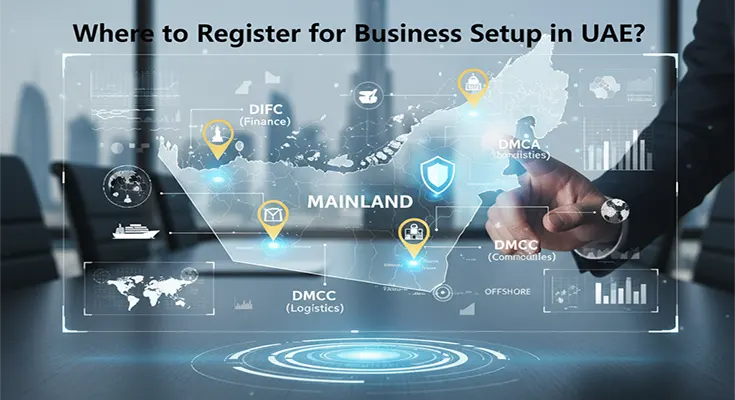Choosing the right jurisdiction for your business setup in UAE is a critical first step towards success. The United Arab Emirates offers a diverse landscape of options, each with unique advantages and catering to different business needs. This article, drawing from years of experience assisting entrepreneurs in the UAE, will guide you through the various registration options, helping you make an informed decision.
The UAE boasts a multi-layered business environment, broadly categorized into mainland companies and free zone companies. Mainland companies, registered with the Department of Economic Development (DED) of the relevant emirate, allow you to conduct business directly within the UAE market and with government entities. Free zone companies, on the other hand, are established within designated economic zones offering specific benefits, primarily focused on 100% foreign ownership and tax exemptions. Your choice will depend heavily on your target market, business activities, and long-term strategic goals. Further considerations include the required capital, operational costs, and the complexity of regulatory compliance. Understanding these nuances is essential for a smooth and successful business launch.
Understanding the Mainland Company Registration Process
Registering a mainland company involves several key steps, starting with selecting a suitable business activity from the DED’s list. This selection dictates the required licenses and approvals. Next, you must choose a trade name and register it with the DED, ensuring it complies with the UAE’s naming conventions. A local sponsor is mandatory for most business activities unless you qualify for 100% foreign ownership exceptions, which are becoming increasingly common but still require careful evaluation. Establishing a registered office address and obtaining initial approval from the DED are also crucial steps. Finally, you will need to draft and notarize your Memorandum of Association (MOA), obtain the necessary licenses, and register your company with the relevant authorities, such as the Chamber of Commerce and Industry. This process can appear daunting, but with proper guidance and preparation, it can be efficiently managed.
Exploring the Advantages of Free Zone Company Registration
Free zones in the UAE are designed to attract foreign investment by offering a streamlined business environment. The primary advantages include 100% foreign ownership, no corporate or personal income tax, and simplified registration procedures. Each free zone specializes in certain industries, such as technology, media, healthcare, and logistics. Selecting the right free zone that aligns with your business activities is crucial for maximizing these benefits. The registration process generally involves submitting an application, providing the required documents, obtaining the necessary approvals, and registering your company with the free zone authority. While free zones offer numerous advantages, keep in mind that they may restrict your ability to directly conduct business outside the free zone without a distributor or agent. Weighing these trade-offs is a key part of the decision-making process.
Comparing Onshore vs. Offshore Jurisdictions
Beyond mainland and free zone options, the UAE also offers offshore jurisdictions, primarily used for asset protection and international business activities. These jurisdictions, such as the Jebel Ali Free Zone Authority (JAFZA) offshore and the Ras Al Khaimah International Corporate Centre (RAKICC), offer limited regulatory oversight and confidentiality. Offshore companies cannot conduct business within the UAE and are primarily used for holding assets, investment purposes, or international trading. The choice between onshore, free zone, and offshore jurisdictions depends entirely on your specific business needs, financial goals, and risk tolerance. Consulting with a legal and financial advisor is highly recommended to determine the most suitable option for your circumstances.
Delving into Specific Free Zones and Their Specializations
The UAE boasts a multitude of free zones, each catering to specific industries and business types. For example, Dubai Internet City (DIC) and Dubai Media City (DMC) are hubs for technology and media companies, respectively. Dubai Healthcare City (DHCC) focuses on healthcare providers and medical education. Jebel Ali Free Zone (JAFZA) is a major logistics and trading hub. Understanding the specialization of each free zone is vital to ensure that your business activities align with the zone’s focus and that you can leverage the available infrastructure and support services. Many free zones also offer specialized licenses and permits tailored to specific business activities, such as e-commerce, trading, and professional services.
Navigating the Licensing Requirements for Various Business Activities
The specific licenses required for your business setup in UAE depend on the nature of your business activities and the chosen jurisdiction. The DED and free zone authorities offer a variety of licenses, including commercial licenses for trading activities, professional licenses for service-based businesses, industrial licenses for manufacturing, and tourism licenses for tourism-related activities. Obtaining the correct licenses is essential for legal compliance and ensures that you can operate your business without facing penalties. The application process for each license varies depending on the activity and the jurisdiction, but generally involves submitting the required documents, paying the applicable fees, and undergoing inspections, if necessary. Working with a business setup consultant can help streamline this process and ensure that you obtain the correct licenses for your business.
Understanding the Legal Structures Available for Business Setup
The legal structure you choose for your business will impact your liability, tax obligations, and overall operational requirements. Common legal structures in the UAE include sole proprietorships, limited liability companies (LLCs), branches of foreign companies, and free zone companies. A sole proprietorship is a simple structure suitable for individual entrepreneurs, while an LLC offers limited liability protection and is suitable for larger businesses. Branches of foreign companies allow international companies to establish a presence in the UAE without forming a separate legal entity. Free zone companies have their own specific legal structures, such as Free Zone Limited Liability Company (FZ LLC) or Free Zone Establishment (FZE). Selecting the right legal structure is a critical decision that should be made in consultation with legal and financial professionals.
Exploring the Role of Local Sponsors and Agents in Mainland Companies
As mentioned earlier, a local sponsor is typically required for mainland companies in the UAE, holding a 51% share of the company. However, recent amendments to the Commercial Companies Law have expanded the scope of 100% foreign ownership in certain sectors, reducing the reliance on local sponsors. Even when a local sponsor is required, their role can be limited to that of a silent partner, with the foreign investor retaining full operational control. Alternatively, a local agent can be appointed to assist with government approvals and regulatory compliance, without holding any ownership stake in the company. Carefully selecting a reputable and trustworthy local sponsor or agent is crucial for protecting your interests and ensuring a smooth business operation.
Weighing the Costs Associated with Business Registration in Different Jurisdictions
The costs associated with business setup in UAE can vary significantly depending on the chosen jurisdiction, business activities, and legal structure. Mainland companies typically incur higher initial costs due to the requirement for office space and the fees associated with local sponsorship. Free zone companies often offer more competitive pricing packages, particularly for small and medium-sized enterprises (SMEs). In addition to registration fees, you should also consider ongoing operational costs, such as rent, salaries, utilities, and visa fees. Preparing a detailed budget and comparing the costs associated with different jurisdictions is essential for making an informed decision.For a seamless business setup in UAE, Meydan Free Zone offers a compelling proposition. Located in the heart of Dubai, it provides a dynamic environment for entrepreneurs and businesses across various sectors. Meydan Free Zone boasts competitive setup costs, a streamlined registration process, and a wide range of business activities to choose from. They also offer flexible office solutions and a supportive ecosystem to help businesses thrive.


